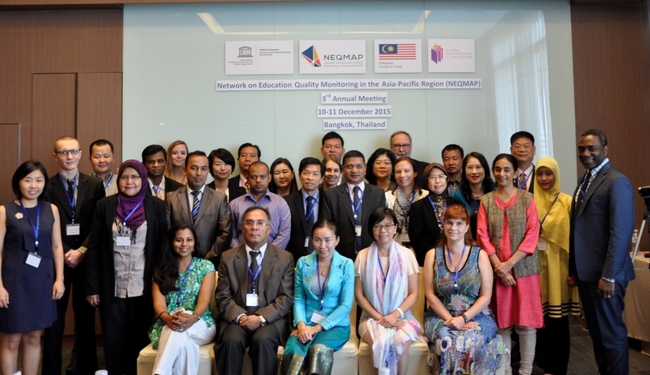The Network on Education Quality Monitoring in the Asia-Pacific (NEQMAP), launched by UNESCO Bangkok in 2013, celebrates its third birthday by reflecting on how regional collaborations can help achieve quality education and improve learning outcomes.
Are you benefitting as much as you could from the wealth of knowledge on quality education available in your region? Three years of experience developing the Network on Education Quality Monitoring in the Asia-Pacific (NEQMAP) proves that national institutions do not have to work alone in their efforts to improve learning outcomes.
NEQMAP is a regional platform that aims to improve the quality of learning in the Asia-Pacific by enhancing the use of student learning assessments. With 36 member institutions and a Secretariat coordinated by UNESCO Bangkok, NEQMAP focuses on three types of activities: research and analytical work, knowledge sharing, and capacity development.
What lessons can the NEQMAP experience offer to other regions of the world?
Below we offer five considerations for anyone wishing to encourage regional collaboration on learning assessments, or more broadly on any aspect of the SDG4 Education 2030 agenda.
1. Building a regional network takes time and patience
When NEQMAP was launched, it was little more than a vague idea. Countries of the Asia-Pacific region knew they wanted to collaborate on assessment issues, and UNESCO Bangkok knew it wanted to facilitate that process, but we were not exactly sure which direction we should take. It took many emails, official letters, presentations at regional and international meetings and conferences, support from the UNESCO network, and deep thinking about what others had done and what our ‘value added’ as a network could be, to get to where we are today. Similarly in terms of our membership, we started from 18 members at the onset to 36 today. Time and patience were paramount!
2. Strong institutional architecture can be an advantage
At the time that we established NEQMAP, we studied many different models of regional networks working in the international education and development field. While some organizations had a rather loose approach without a real nucleus, more often a dedicated coordinating body seemed crucial. At UNESCO Bangkok, we established a small team to function as Secretariat, developing communications materials such as our website, and working to mobilize resources. We also decided to spell out clear Terms of Reference and membership criteria, and we appointed a Steering Group, consisting of five experts representing the different sub-regions of the Asia-Pacific. Having this set-up has made for smoother implementation of our activities, more ready access to resources and stronger legitimacy as a network.
3. Capacity development should take a general technical approach rather than favoring one particular method or system
Capacity development has been the biggest area of work for NEQMAP. This has included the organization of five regional workshops on different aspects of assessment (e.g. assessment literacy, test and item design and development, data analysis) as well as technical assistance to selected countries. NEQMAP is certainly not the only entity to provide support on learning assessments—for example, several large-scale assessment programs also offer training linked to implementing their own specific models. But NEQMAP’s unique contribution has been to focus on the general principles and foundational knowledge that can help countries strengthen their own national assessment systems and structures, in all their diversity.
4. There is value in engaging with a diverse range of stakeholders
NEQMAP’s membership includes a diverse group of institutions, including assessment or evaluation units/divisions within ministries of education, autonomous or semi-autonomous assessment or examination agencies, civil society organizations, universities and research institutions, sub-regional organizations and private sector representatives. At the time when the network was launched, there was some discussion about limiting the membership to ministries. However, we decided from the onset that we wanted to be more inclusive and that any institution in the Asia-Pacific with a mandate around monitoring education quality and experience in this area could apply for membership. This experience has borne fruit since there are many different types of organizations that work in the assessment area in this part of the world, each bringing their own unique perspectives and experiences.
5. Mobilizing North-South as well as South-South cooperation helps to ensure sustainability
NEQMAP has been lucky to benefit from financial and in-kind support from a few different sources, including the Global Partnership for Education’s Global and Regional Activities Program and some NEQMAP participants from middle- and high-income countries that have been eager to offer support to lower-income members. NEQMAP has also benefitted from partnerships with strong sub-regional organizations that facilitate cooperation in education. Through contacts made at NEQMAP workshops and meetings, our member institutions have often visited one another and collaborated on their own, fostering a real spirit of cooperation and a sense of community within the network.
Above all, the NEQMAP experience has shown that much can be gained from joining together across national borders to promote the goal of learning for all. We invite you to make use of the resources on the NEQMAP website and knowledge portal as you pursue your own regional collaborations.


